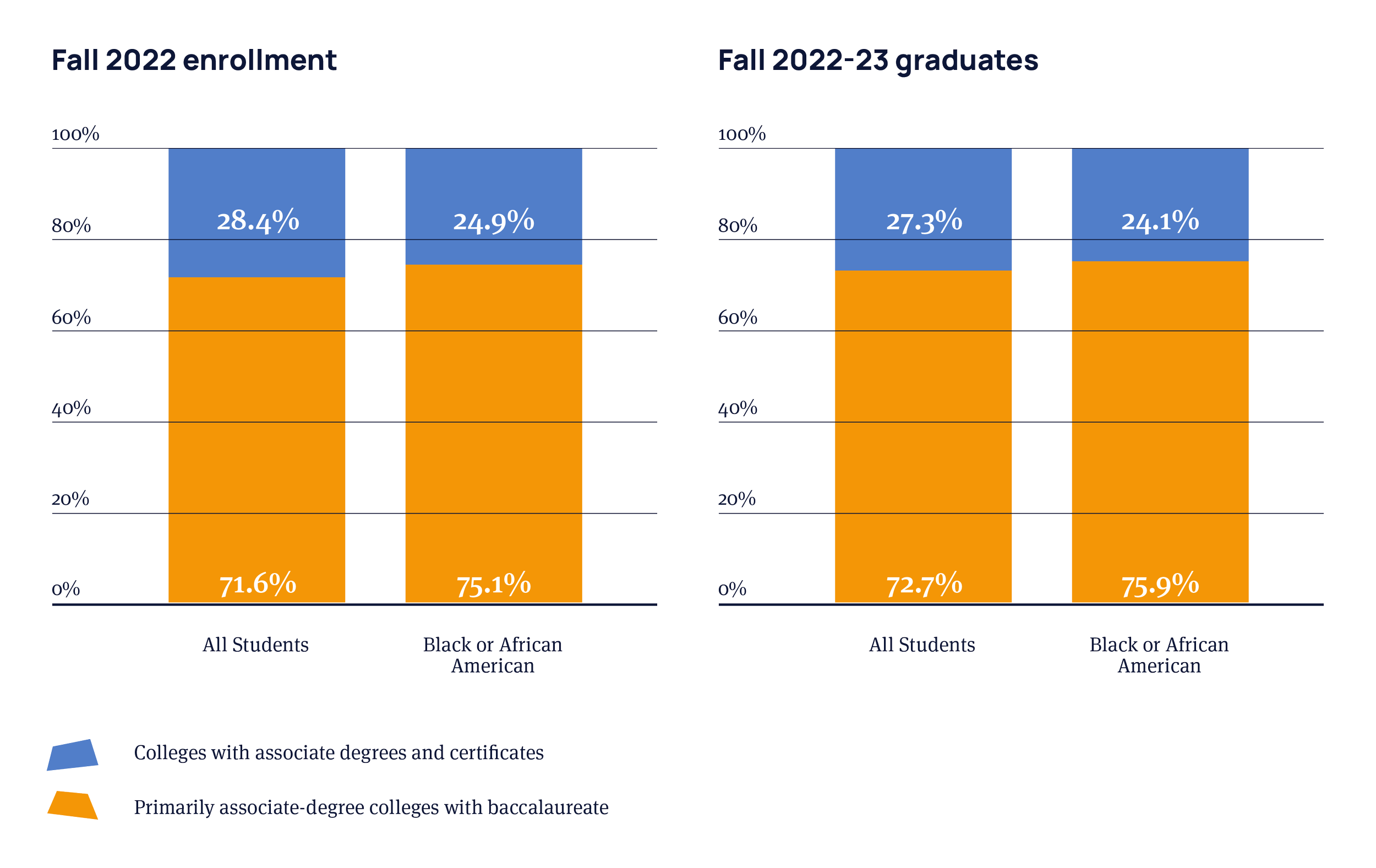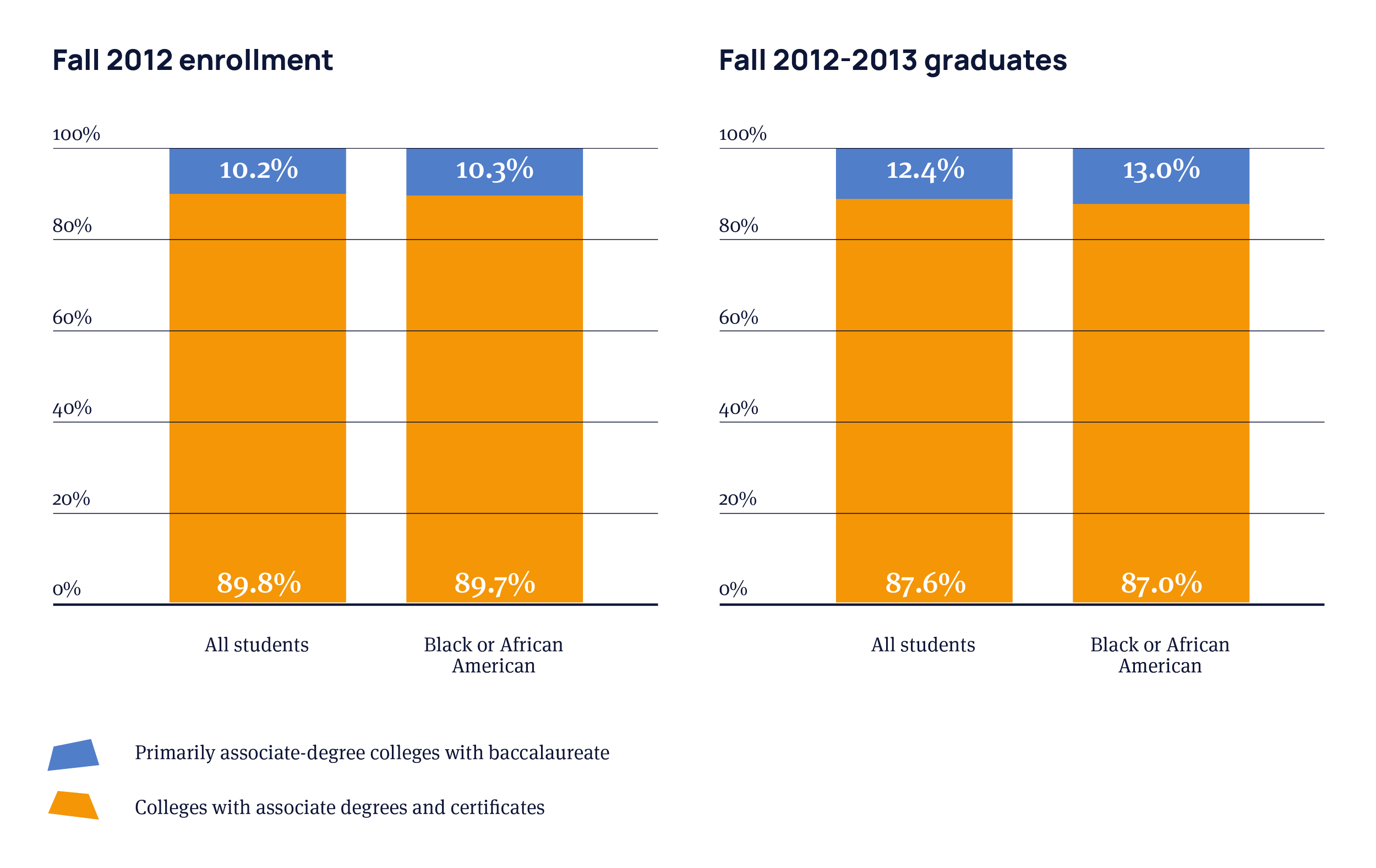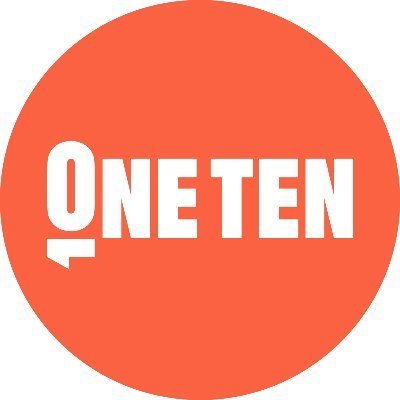
Learn about critical issues based on data and acquire the tools needed to support Black learners
Our nation has long underserved Black learners in higher education
Through this interactive playbook, gain an understanding of critical issues based on the research presented, acquire the tools needed to support Black learners, and begin to identify what steps you can take after viewing spotlighted examples
This playbook is a call to action for key players—postsecondary institutions, state policymakers, federal policymakers, and community and business leaders—to uphold practices and policies that reinforce the value proposition of higher education for Black learners and dismantle the structures that function as barriers to Black learner success. It is a tool for all to use in their respective realms while elevating Black student voices. Each stakeholder group plays an important role in increasing postsecondary access and outcomes for Black learners.
Explore this interactive playbook
State policymakers have law-making and budget authority to bolster accountability, affordability, transparency, and consumer protection, and they subsidize institutions where most Black learners enroll.
LEARN MORE ➔Federal policymakers have authority and funding to address affordability, strengthen data and delivery systems, oversee accreditation, and incentivize states and institutions to bolster foundational policies and target support to Black learners.
LEARN MORE ➔Higher Education Institutions are on the front lines serving Black learners with campus policies and practices that promote access and success, including a focus on increasing transparency, improving the value proposition, and cultivating a sense of belonging.
LEARN MORE ➔Community and business leaders are invaluable partners to advocate for Black learner excellence, provide work experiences, connect learners to human services, and foster community through mentorship.
LEARN MORE ➔
In order to LEVEL UP, key leaders are compelled to GET REAL
REAL Transparency and True Affordability
We must focus not only on increasing need-based aid, but also on making more visible the bottom-line cost students will pay, based on a realistic assessment of what students can reasonably afford.
Ensured Success Through Shared Ownership
At each level—federal, state, system, and institutional—we must create mechanisms to support Black learners and ensure shared accountability for their success in and beyond their postsecondary experiences.
Academic and Social Supports that Create a Sense of Belonging
Institutions and systems must proactively consider the disproportionate challenges facing Black learners inside and outside the classroom by developing supports and connecting them to community resources. This will afford opportunities to provide robust advising, support to access pathways to high-wage and high-demand jobs, and assistance to address critical issues in an environment that fosters respect and a sense of belonging.
Learner-Centered Teaching Practices for Black Learners
Teaching practices should center students’ lived experiences, perspectives, strengths, and needs as grounding for learning.
Explore stories from around the country in our interactive map below.
Public university systems are collaborating to improve credential completion and social mobility by addressing several key imperatives, including equity and learning. The initiative is seeking to shift to a student-centric focus and share ways to teach students by recognizing individual learning and social-emotional needs and advancing equity in academic and experiential curricula.⁹⁹
Twelve states across the nation, from nearly all regions and regardless of political party control, have enacted FAFSA completion policies to require or encourage high school seniors to file the form.⁶⁰ Most states have developed a multipronged effort with statewide outreach, student support, K−12 training, data sharing, and highlighted best practices.
Year Up offers a one-year training program with paid internship and support and has been recognized for supporting achievement among Black learners.¹⁷⁸
Boston, Massachusetts
Complete College America created a network of community colleges to align academic programs with workforce needs for Black learners. Participating colleges will share expertise and receive technical assistance focused on workforce alignment, basic needs, and other key topics.¹⁷⁷
Indianapolis, Indiana
California Funders for Boys and Men of Coloraligns leading philanthropic entities with the goal of improving opportunities for Black, Latino, Asian/Pacific Islander, and Native American young men in the San Francisco and Los Angeles communities. The network offers programming and legislative advocacy to remove structural barriers.¹⁷¹
Sacramento, California
Take Off: Institutional Innovations for College Men of Color is a project of the University of Southern California’s Race and Equity Center. The philanthropic-supported project supports 12 community colleges nationwide to bolster initiatives advancing the success of Black learners and men of color.¹⁷⁰
Los Angeles, California
Regional partnerships in the Seattle area focus on advancing Black learner success through data-driven strategies and support from middle school through postsecondary education. In the same region, a Black and Brown Summit, sponsored by community partners, is an annual event designed to empower and motivate Black and Brown young men in high school to excel in academics and strive for excellence.¹⁶⁸
Seattle, Washington
The National Black Justice Coalition is a civil rights organization with a focus on education that is working to end discrimination against Black LGBTQ+ individuals.¹⁶⁷
Washington, D.C
Under the Achieve Atlanta initiative, higher education institutions and college access partners support Atlanta Public Schools to provide district-wide college advising to all juniors and seniors.¹⁶⁶
Atlanta, Georgia
The National Cares Mentoring Movement seeks to transform the lives of impoverished Black children through a national network of volunteer mentors. An example is the collaboration between higher education and community partners in New York City.¹⁶⁵
New York, New York
The African American Trade Association promotes trade, commerce, economic development, and well-being through education, collaboration, and lucrative partnerships that advance opportunities for Black communities.¹⁵⁸
Denver, Colorado
The Albuquerque African American Chamber of Commerce focuses on education, advocacy, mentorship, and networking to promote Black- owned businesses.¹⁵⁷
Albuquerque, New Mexico
NAACP partnered with Google to expand a high school program preparing students for tech fields. 155 Additionally, Grow with Google supports HBCUs to encourage Black learners to pursue technology fields.¹⁵⁶
Baltimore, Maryland
The Atlanta Wealth Building Initiative established a new framework for community leaders, researchers, policymakers, practitioners and philanthropists to advance solutions to build Black wealth in the region.¹⁵⁰
Atlanta, Georgia
OneTen seeks to create 1 million jobs in 10 years to unlock opportunities for Black learners and workers. Employers and community partners provide support, training, and hiring to close gaps in the Black talent pipeline.¹⁴⁹
Washington, D.C
The Scholarship Academy supports Black learners in Georgia, New York, and Washington D.C., helping students from low-wealth backgrounds navigate financial aid and access scholarships.¹⁴⁷
Atlanta, Georgia
The National Action Council for Minorities in Engineering offers $3 million in scholarships to underrepresented minorities pursuing engineering.¹⁴⁵
Additionally, the Executive Leadership Council seeks to expand Black executives and offers scholarships to Black learners.¹⁴⁶
Alexandria, Virginia
The National Endowment for the Humanities, an independent federal agency, supports professional development institutes for higher education faculty. The convenings support higher education faculty from across the nation to deepen their understanding of significant topics and enrich their capacity for effective scholarship and teaching.¹³⁶
Washington, D.C
The Augustus F. Hawkins Centers of Excellence Program aims to support centers of excellence at historically black colleges and universities or other minority serving institutions to increase the number of well-prepared educators and teachers of color.¹³⁵
Washington, D.C
The Child Care Access Means Parents in School program helped 3,300 student parents pay for child care with payments of $385 per month on average. Appropriations for the program have increased from $15 million in FY 2017 to $75 million in FY 2023. In FY 2022, 300 new institutions were awarded $150,000 per year on average.¹³²
Washington, D.C
YouthBuild is a pre-apprenticeship program to expand postsecondary opportunities for those without high school diplomas. The program serves 5,000 youth across 40 states.v
Washington, D.C
The College and Career Readiness Evaluation Consortium is a collaboration of 28 GEAR UP grantees across 630 middle and high schools interested in understanding the impact of interventions.¹³⁰
Washington, D.C
Lawmakers established a congressional caucus focused on predominantly Black institutions to educate policymakers on the important role these institutions play in serving low-income, first-generation, and minority students.¹²⁵
Washington, D.C
Recent changes to gainful employment regulations ensure that 32,000 federally supported career training programs require graduates to have an affordable level of debt and receive an earnings premium to qualify for federal financial aid.¹²⁴
Washington, D.C
The former Leveraging Educational Assistance Program can serve as a blueprint to develop a strong federal-state partnership that expands access to underrepresented and low-income students.¹²³
Washington, D.C
Since 2009, the Internal Revenue Servicedata retrieval matchprocess has improved, reducing both the number of FAFSA questions students and parents must complete and the burden of providing verification of eligibility.¹¹⁵
Washington, D.C
The U.S. Department of Education updated its student loan management provisions to increase the accountability of servicers, allow borrowers to access their loans through a centralized website, and reduce disruptions from account transfers.¹¹³ This is especially important to ensure Black borrowers, half of whom report that their loan debt is more than their net worth, can access repayment benefits.¹¹⁴
Washington, D.C
The recent overhaul of the FAFSA application streamlines the process and expands access to Pell Grants, starting with the 2024−25 application.¹¹¹ As Black learners are more likely to receive the Pell Grant, these improvements are critical.¹¹²
Washington, D.C
Texas leveraged its state-funded work-study program to create a mentorship program to improve completion and career readiness.⁹⁵
Austin, Texas
Tennessee created a statewide mentoring program for financial aid recipients. Volunteers support students with navigating enrollment and meeting Promise program requirements.⁹⁴
Nashville, Tennessee
Data Points
Community college enrollment 2022 and 2012 by presence of bachelor’s degree programs
Source: Level UP analysis of IPEDs institutional characteristics 2012-13 and IPEDs fall enrollment 2022 and 2023



“I've dealt with racism, criticism and discrimination in my educational journey, and my job is to remove those barriers for students – especially students that look like me.”
— Dr. Keith Curry, President & CEO of Compton College



























